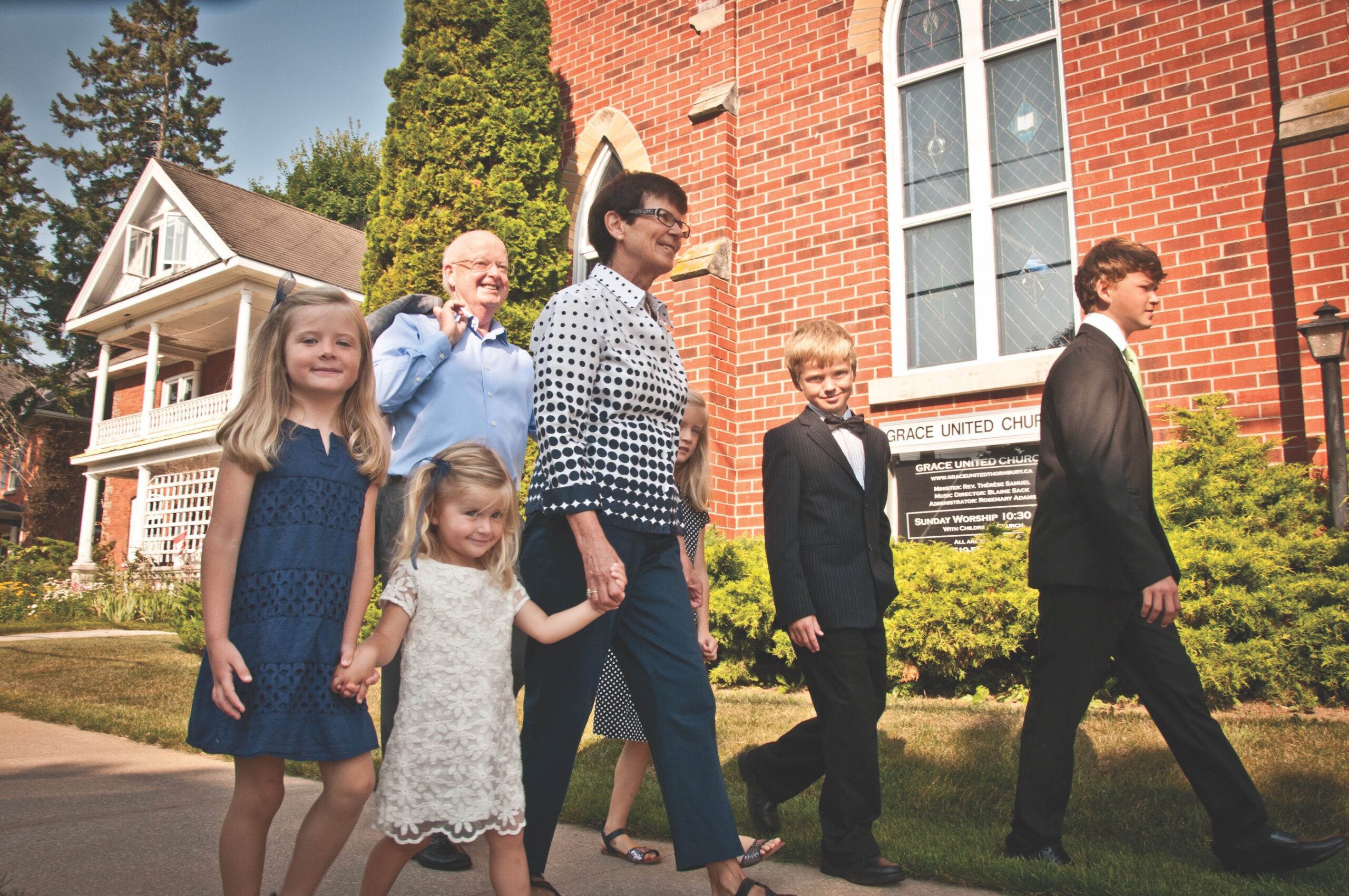A generation of 30- and 40-year-olds may be missing from United Church pews, and most Sunday schools are shrinking. But many children are now showing up to worship — with their grandparents.
In one Toronto congregation, most members of a junior choir come with grandparents in tow. In other churches, grandchildren attend Sunday school and enrol in vacation Bible school programs.
You may unsubscribe from any of our newsletters at any time.
The result is a growing buzz around grand-parents’ involvement in their grandchildren’s spiritual development, as well as intriguing questions about the parents’ role in the equation. While many moms and dads use the time their children are at church to work, run errands or sleep in, others are following their kids’ lead and becoming more involved in church life. For congregations, the challenge is to find ways to encourage the grandparents’ efforts and to keep the children coming back, with or without Mom and Dad.
Lorraine Otto, who completed a master of divinity at Halifax’s Atlantic School of Theology last spring and was ordained as an Anglican deacon, looked into the influence of grandparents for her graduate research project. After interviewing grandparents who take grandchildren to church in several United, Anglican and Roman Catholic congregations in the Maritimes, she found lessons for both grandparents and congregations.
Grandparents, she says, have to take a low-key, no-guilt approach to getting parents’ consent for churchgoing. Most of the parents she interviewed had no objection to their kids attending church. But in a few cases, their spouses were “anti-church” and wary of their children’s involvement. In at least one case, the spouse was on the lookout for reports of dogmatic teachings.
As for churches, says Otto, “the biggest thing is to have a welcoming congregation that’s relaxed with children and ready to help grandparents get involved.” Her report says congregations should accept children for themselves (without asking about their parents), include them in liturgy and activities, help clergy get comfortable with children, and learn not to “mind a little noise.”
At Rosedale United in downtown Toronto, the junior choir has been a catalyst for bringing grandchildren into the congregational mix. Marjorie Lenz takes two of her three grandsons — Nolan, 4, and Asher, 5 — to weekday choir practice, picking them up after school. Most of the choir’s dozen members come with their grandparents, many of whom stay to help. When the children sing during Sunday worship, at least once a month, parents often attend.
The choir is just one aspect of the congregation’s programming for children and youth. But for Lenz, it means her grandchildren have become comfortable in the congregation and church building. They love the singing — every practice ends with a rousing version of the action-packed kids’ song Go Bananas — but they also get “little moments of teaching, not preaching, just little tidbits” of faith from the songs and the choir director’s comments, she says.
For her daughter and son-in-law, who both grew up as churchgoers, the choir means help with child care during weeks that are already busy with work and commuting. It also means occasional visits to church.
Like most parents, Marjorie and Bob Lenz would be happy to see their own children take an increased interest in church life. But their focus is on getting their grandchildren involved.
Church “is a way for grandparents to have a special relationship with their grandchildren that isn’t mediated by the parents,” says Amy Crawford, General Council’s staff person for youth, young teens and children. At the same time, she emphasizes that it can’t be done without the parents’ approval.
Donna Kearns of Grace United in Thornbury, Ont., says her children and their spouses “are quite pleased that the kids are coming to church,” and often attend special events or accept family duties like candle lighting. But for them and most of their generation, Sunday morning worship “is simply not on the radar.”
Kearns and her husband, Rob, began taking their first grandchild to church shortly after moving to the Georgian Bay community and joining the congregation about 14 years ago. They now have three granddaughters and two grandsons who live nearby and often attend church with them. Another grandson and granddaughter living in Toronto also join when they visit.
The congregation’s Sunday school, called Grace-ful Moments, usually has “lots of children attending and good leadership,” says Kearns. “I saw this comfort level with children that I had not witnessed in the church before and thought it would be very good for my grandchildren to see the joy of a Christian community and to expose them to the teachings of Christianity.”
Like most congregations that successfully engage and involve children, Grace United regularly gives kids leadership roles in worship services.
Also, says Crawford, congregations have to meet the parents’ desire to provide “the best for their children.” This means churches “need to be providing places of gracious hospitality and safety and cleanliness, things that sometimes the previous generation didn’t worry about.”
Grandparents whose grandchildren live nearby can make church a regular activity. But out-of-town grandchildren can also get connected on visits through special activities or programs, says Rev. Susan Lukey, part of the ministry team at High River (Alta.) United. For example, some grandparents arrange for the children to visit during the church’s summer Bible school.
Most grandchildren, says Lukey, “love coming here and being involved. . . . They’re always enthusiastic.” As well, “there’s something really special about that relationship when grandparents are able to share their faith with grandchildren. . . . There is a different openness to receiving wisdom and faith from grandparents.”
Rev. Kristin Philipson, Rosedale United’s part-time minister of children and youth, understands this feeling well. As a child growing up in Edmonton, her grandparents took her to church. “And here I am 30 years later, a United Church minister.”
Like many ministers, she watches for opportunities — such as Christmas pageants or dramatic presentations — when grandchildren can participate on a time-limited basis. Often, says Philipson, they first show up at church before Christmas, “and it kind of just builds from there.”
Rev. Karen Bridges, minister of congregation and community development at Robertson-Wesley United in Edmonton, says she has “been targeting grandparents a bit more” and letting them know about projects or programs that could appeal to their grandchildren. She says most of the grandchildren coming to her church are either having a sleepover with their grandparents or attend church with them on Sundays when their parents are working. “The grandparents want the children to have a sense of faith,” she says.
For Joanne and Clarence MacPherson, longtime members at Westminster United in Whitby, Ont., going to church with their grandchildren — Leila, 5, and Ruby, 4 — evolved naturally from Saturday-night babysitting sessions. “They know a lot of people there now,” says Joanne MacPherson. “The connection is there.”
Barbara MaLette, of Vancouver, a retired teacher who attends St. Andrew’s-Wesley United with her eight-year-old granddaughter Allison, says congregations also have to welcome children in worship. “At the beginning of church, they announce, ‘We accept the wiggles. So children can go off to Sunday school or we have a little nursery, but if you would like to keep your child with you, please do so.’” An area at the side of the sanctuary has a table with crayons and paper for children who stay in worship.
Also, says MaLette, both Sunday school and worship have to keep children engaged. “Life has gotten so exciting that you have to step up to the plate, or church is too boring for kids.” So far, that hasn’t been a problem in her busy downtown congregation, which had a balloon-shooting cannon one Easter morning and recently hosted a Star Wars-themed worship.
Through all the activities, programs and services, though, grandparents want their grandchildren to hear the Christian story, absorb the faith and ask questions. “In order to make a choice about religion, you have to first know about religion, so I wanted to give my granddaughter that opportunity,” says MaLette.
In a world dominated by a big-screen Hollywood version of love, Donna Kearns wants her grandchildren “to know love from a Christian perspective, the broader concept. . . . Love your neighbour and that sort of thing.”
While listening to a popular hymn in worship recently, Kearns realized that she also hopes church will help her grandchildren to “be good citizens and go make a difference.”
She adds, “It doesn’t mean people who are not taking their children or grandchildren to church are not working on the same goals and values, but I think church can contribute a lot and help a lot in getting good citizens.
***
This story first appeared in The United Church Observer’s September 2014 issue with the title “Taking the grandkids to church.”













